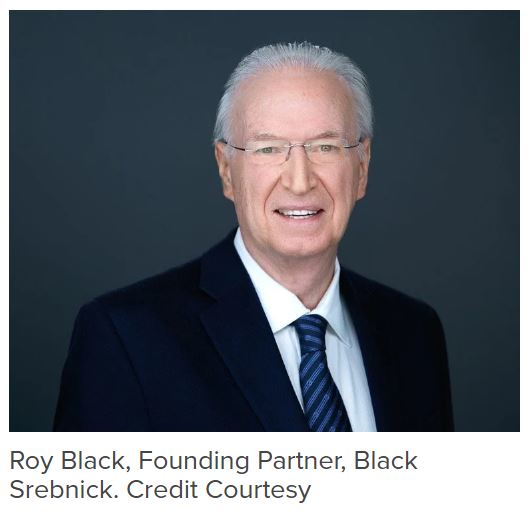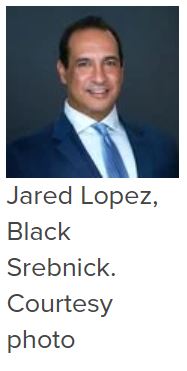‘Might as Well Have Artificial Intelligence’: Roy Black is Bothered by This Courtroom Trend
|
|
|
 |
“Advocacy may not be dead, but it’s certainly on life support,” said Roy Black, a Miami trial lawyer with more than five decades of courtroom experience. |

Roy Black has a warning for all lawyers who take advocacy for granted: “I just think that advocacy may not be dead, but it’s certainly on life support and it needs a lot more attention by the bar and the public. Otherwise, we’re going to lose our adversary system of justice.”
The legal legend is a partner at Black Srebnick in Miami. He has seen 53 years of lawyering.
But he is not impressed with the direction the industry’s headed, and wants to make sure his colleagues are aware of a troubling trend.
In a letter to editor of ALM’s Daily Business Review, the litigator wrote in defense of a trial lawyer slapped with a criminal contempt violation in court at the end of closing arguments.
“The reason I wrote the letter was not to criticize the judge, who is an old friend of mine—though he probably didn’t like it—but it’s difficult [when ]the judge says, ‘OK, you have 40 minutes for final argument.’ Why do we have a limit like that?”
Click here to read the full letter
Black said, “We spent a couple of hundred years developing this adversary system of justice, and now we don’t want to use it because it’s either impractical or not efficient or takes too much time.”
 |
Jared Lopez, managing partner with Black Srebnick, understood the litigator’s thinking, having seen first hand Black’s dedication to the profession. “Roy’s passion for advocacy is grounded in his profound belief that among the most important responsibilities a trial lawyer has is to speak for someone other than themselves,” Lopez said. |
‘We’re Losing the Whole Tradition’
Black wants others to see what he is seeing: a trend that he says is stifling trial advocacy.
He doesn’t think today’s judges have the appreciation for advocacy like they did.
“I think we’re losing the whole tradition of lawyers arguing in court, giving emotional arguments, giving human arguments, addressing human beings in the jury box,” he said. “We’re not going to have great trial lawyers unless they have trials to train on. So I think that trial advocacy keeps getting less and less important.”
‘Go to the State Courts’
In his five decades of teaching students at the University of Miami evidence and trial advocacy, Black says it’s important for new lawyers to get trial time in, and federal court is not the place these days to get experience.
“Go to the state courts,” he said. “At least there they still have trials. This legal community has always been blessed with great trial lawyers. I want to see that tradition continue.”
Black began as a Miami public defender and has risen to the pinnacle of the law community. He is the recipient of a plethora of awards, accolades and acknowledgments for his work as lawyer and teacher.
|
But his worst fears are being realized, he says, as judges display what he feels is less and less patience to let the judicial system play out for attorneys—young and old. “They limit the time you can argue your case, both in the opening and the closing,” Black said. “And so we’ve got this problem now that there’s less and less advocacy.” |
 |
“It’s like designing a spaceship and we no longer go to the moon … so to me, it’s just very frustrating that our system of justice is giving lawyers short shrift,” Black continued. “They’re not given the opportunity to argue on behalf of their clients to make a pitch as to why they’re innocent or guilty. … And I think that that is a horrible trend.”
‘That’s What We’re Coming to’
Open AI’s ChatGPT should be worrisome, Black said.
“Today, we might as well have artificial intelligence, … like … ChatGPT,” he said. “We can have A.I. print out the monologue, and they had somebody who wanted to pay a million dollars for a robot lawyer to argue with the Supreme Court. That’s what we’re coming to because we no longer have these great trials.”
Black blames the trend of reduced trial time on increased occurrences of mediation to conclude cases, and admits jury attention span is not what it used to be. But he said all great advocates must practice humility.
The veteran litigator advises: “If it ever comes across to a judge or to a jury that you are an arrogant person, that you’re looking down on them that you think that they are lesser human beings than you because you’re a famous lawyer, they’re going to cut your legs out from you.”

